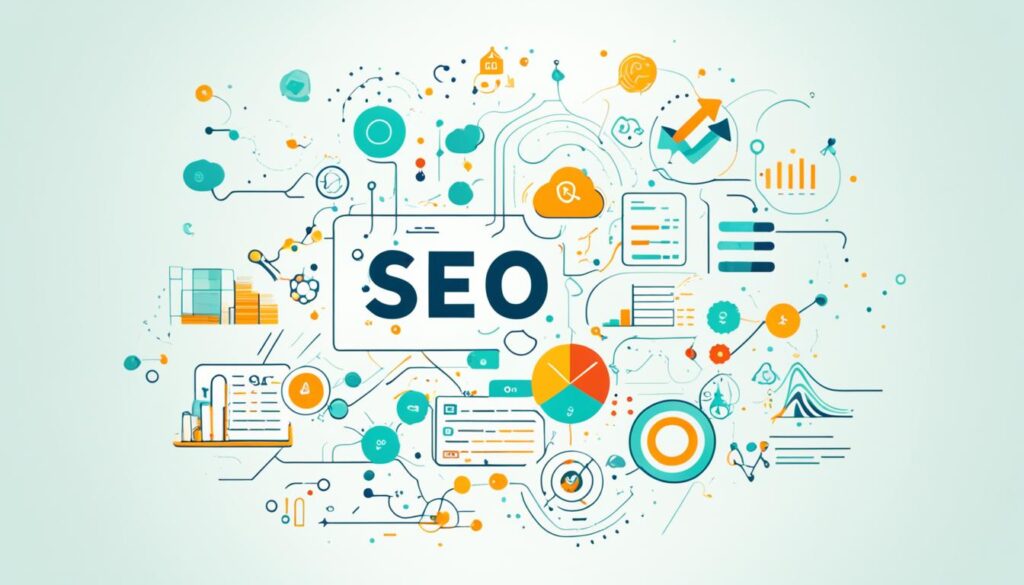SEO plays a vital role in the success of businesses in the digital landscape. However, it’s important to understand that effective SEO comes at a cost. As we look ahead to 2024, businesses will need to consider the budget they allocate for SEO services. The price of SEO can vary depending on several factors, including the specific services required and the size of the business.
When it comes to SEO pricing, there are various options available to cater to different budgets and needs. Affordable SEO services, such as cost-effective SEO packages, provide businesses with an opportunity to enhance their online presence without breaking the bank. These budget-friendly options offer competitive SEO pricing and deliver valuable results in terms of website visibility and organic traffic.
In 2024, investing in SEO will be crucial for businesses looking to establish a strong online presence and drive growth. By allocating resources towards SEO, businesses can expect a significant return on their investment. As the digital landscape becomes increasingly competitive, the impact of SEO expenditure will be more pronounced, making it essential for businesses to prioritize SEO strategies.
Key Takeaways
- SEO services in 2024 will come at a cost that can vary based on specific needs and the size of the business.
- Affordable SEO services, including cost-effective packages, offer competitive pricing options for businesses on a budget.
- Investing in SEO is an essential step for businesses looking to establish a strong online presence and drive growth.
- SEO expenditure in 2024 will have a significant impact on a business’s organic visibility and website traffic.
- It’s crucial for businesses to prioritize SEO strategies to stay competitive in an increasingly crowded online marketplace.
Types of SEO Costs
When it comes to SEO, there are various cost components that businesses need to consider. Understanding these different types of costs can help you plan your SEO budget effectively. Let’s break down the key SEO cost components:
1. SEO Audit Cost
An SEO audit is the first step in optimizing your website. It involves analyzing your website’s structure, performance, and SEO-related aspects to identify areas for improvement. An audit typically includes:
- Evaluating website structure and navigation
- Assessing on-page elements like titles, meta descriptions, and headings
- Identifying technical issues such as broken links and page load speed
2. Content Creation Cost
Creating high-quality, keyword-optimized content is crucial for SEO success. Content creation cost includes:
- Researching keywords and topics
- Writing and optimizing website content
- Creating engaging blog posts or articles
3. Link Building Cost
Building a strong network of backlinks from authoritative websites is a fundamental aspect of SEO. Link building cost includes:
- Identifying relevant websites for link opportunities
- Outreach and relationship building with website owners
- Acquiring high-quality backlinks
4. Technical Configuration Cost
Optimizing the technical aspects of your website helps search engines crawl and index your pages effectively. Technical configuration cost may include:
- Improving website loading speed
- Optimizing mobile responsiveness
- Fixing broken links and resolving website errors
5. SEO Research Tools Cost
SEO research tools provide valuable insights and data to guide your SEO strategy. This may include:
- Keyword research tools for identifying valuable search terms
- Competitor analysis tools to gain insights from your competitors
- Rank tracking tools to monitor your search engine rankings
6. SEO Reporting Tools Cost
Tracking and measuring the success of your SEO efforts is essential. SEO reporting tools help you monitor key metrics and generate reports. These tools may include:
- Analytics platforms for tracking website traffic and user behavior
- Rank tracking tools to monitor keyword rankings
- SEO audit tools for generating comprehensive website reports
SEO Pricing Models
When it comes to pricing SEO services, there are several models that businesses can consider. Each model has its own advantages and is suitable for different needs. Let’s explore the various SEO pricing models available:
1. Hourly Rates
Hourly rates provide flexibility and are commonly used by SEO consultants and freelancers. With this model, you pay an hourly rate for the time and expertise dedicated to your project. Hourly rates are ideal for small-scale projects or businesses looking for short-term SEO assistance.
2. Project-Based Pricing
Project-based pricing offers a fixed cost for a specific scope of work. This model is beneficial when you have a well-defined project with clear deliverables. With project-based pricing, you know exactly what you’re getting and how much it will cost upfront. It is commonly used by SEO agencies and consultants.
3. Monthly Retainers
Monthly retainers are preferred for ongoing SEO services. With this model, you pay a fixed monthly fee for a comprehensive range of SEO activities. Monthly retainers provide consistent support and are suitable for businesses that require continuous SEO efforts to maintain and improve their online presence.
The cost of SEO services can also vary based on the size of the business. Smaller businesses typically require less extensive SEO work compared to larger enterprises. This often reflects in the pricing, with smaller businesses paying lower fees for SEO services.
To further illustrate the differences in pricing ranges, here’s a comparison table of SEO pricing based on service providers:
| Service Provider | Pricing Range |
|---|---|
| SEO Agencies | $$ – $$$$ |
| SEO Consultants | $ – $$$ |
| SEO Freelancers | $ – $$ |
Remember, the pricing models mentioned above serve as general guidelines. The actual pricing may vary depending on your specific requirements, the complexity of the project, and the expertise and reputation of the service provider.
Now that you have a better understanding of SEO pricing models, you can choose the one that aligns with your budget and objectives. Whether you opt for hourly rates, project-based pricing, or monthly retainers, finding the right SEO service provider is crucial for achieving your online goals.
How To Determine the Best SEO Strategy
Determining the best SEO strategy for your website requires careful consideration of various factors. Whether you choose to work with an SEO consultant, an SEO agency, or take the DIY approach, having a well-defined strategy is key to achieving your optimization goals.
Conduct Thorough Research and Reviews: Before diving into your SEO strategy, it’s important to conduct thorough research on your target audience, competitors, and industry trends. Analyze keyword rankings, search volume, and user behavior to gain insights into what will work best for your website.
Transparent Communication: Effective communication is crucial when working with an SEO consultant or agency. Clearly articulate your business goals, expectations, and any unique requirements. Collaboratively define KPIs (Key Performance Indicators) to track progress and success.
Customized Strategies: An effective SEO strategy should be tailored to your website’s specific needs and goals. Whether it’s on-page SEO, off-page SEO, or a combination of both, your strategy should address key areas such as keyword optimization, content creation, website architecture, and user experience.
Understanding On-Page SEO and Off-Page SEO: On-page SEO refers to the optimization techniques implemented directly on your website, such as optimizing meta tags, headings, and content. Off-page SEO involves activities outside your website, like link building, social media promotion, and influencer outreach. Understanding the differences between these two approaches will help you prioritize your optimization efforts.
Localized or International Audience: Identify whether your target audience is local or international to tailor your SEO approach accordingly. For local businesses, implementing local SEO strategies, such as optimizing your Google My Business listing and getting listed in local directories, is crucial for increasing visibility in specific geographic regions. On the other hand, international SEO focuses on optimizing your website to target users in multiple countries and languages.
SEO vs. SEM: Differentiate between SEO (Search Engine Optimization) and SEM (Search Engine Marketing), which involves paid search ads. SEO focuses on organic search results and optimizing your website to rank higher, while SEM involves paid advertising to increase visibility on search engine results pages (SERPs). Consider your budget, time frame, and the level of competition when deciding which approach is best suited for your business goals.
SEO Checklist: A comprehensive SEO checklist can serve as a valuable tool to assess your website’s current status and identify areas for improvement. This checklist should cover essential aspects such as keyword research, website structure, URL optimization, mobile-friendliness, site speed, and more.
To determine the best SEO strategy for your website, it’s crucial to evaluate your specific needs, collaborate with SEO experts if necessary, and continuously review and adapt your approach based on performance data and industry trends.
Remember, SEO is an ongoing process, and the strategies that work today may evolve tomorrow. By staying informed, implementing effective tactics, and regularly monitoring your performance, you can maximize your website’s visibility, organic traffic, and overall success.
The ROI of SEO
Investing in SEO can have a significant impact on a business’s bottom line. The return on investment (ROI) from SEO can be substantial, making it an essential component of any digital marketing strategy.
One of the key benefits of SEO is its ability to drive organic search traffic to a website. Organic search traffic refers to visitors who find your website through search engine results without any paid advertising. This type of traffic is highly valuable as it consists of potential customers actively searching for products or services related to your business.
Research has shown that companies that invest more in SEO tend to be more satisfied with their results. This is because SEO can help businesses increase their online visibility, improve brand recognition, and attract a steady stream of qualified leads.
Calculating SEO ROI involves comparing the revenue generated from SEO efforts against the cost of implementing SEO strategies. To determine the ROI, you can use the following formula:
SEO ROI = (SEO Revenue – SEO Costs) / SEO Costs
This formula allows businesses to quantify the specific return on investment they have gained from their SEO campaigns. By subtracting the total value of conversions from the SEO costs and dividing the result by the SEO costs, businesses can determine the ROI as a percentage.
Many businesses find that the benefits they reap from SEO, such as increased website traffic, improved brand visibility, and higher revenue, far outweigh the costs associated with SEO services. The ability to reach a wider audience and engage with potential customers organically can have a significant impact on a business’s overall success.
SEO ROI Example:
To illustrate the calculation of SEO ROI, let’s consider an example:
| SEO Revenue | SEO Costs | SEO ROI |
|---|---|---|
| $10,000 | $2,000 | 400% |
In this example, a business generated $10,000 in revenue from its SEO efforts, while the total cost of implementing SEO strategies was $2,000. By applying the SEO ROI formula, we find that the ROI is 400%. This means that for every dollar invested in SEO, the business received a return of $4.
It’s important to note that SEO ROI can vary depending on various factors, including industry competition, the quality of SEO strategies implemented, and the specific goals of the business. Therefore, it’s crucial for businesses to continually track their SEO performance and adjust their strategies accordingly to maximize their ROI.

By prioritizing SEO and understanding its potential ROI, businesses can position themselves for long-term success in the ever-competitive digital landscape.
SEO Success Stories
Real-life success stories demonstrate the remarkable impact of SEO investment on business growth. Businesses of all sizes and industries have witnessed tangible results through their strategic SEO efforts. Let’s explore some notable success stories across different sectors:
1. Small Business SEO Success:
Local small businesses have experienced significant growth in their search visibility and customer engagement thanks to targeted SEO strategies. By implementing best practices such as optimizing their websites for local search, creating compelling content, and building quality backlinks, small businesses have managed to attract more local customers and outshine their competitors.
2. E-commerce SEO Success:
E-commerce stores have reaped the rewards of comprehensive SEO strategies by witnessing a substantial increase in sales and revenue. By optimizing product pages, improving website speed and performance, and leveraging effective link building tactics, e-commerce businesses have successfully climbed the search engine rankings. This improved visibility has led to higher organic traffic, more conversions, and ultimately, increased profits.
3. Enterprise SEO Success:
Large enterprises that have consistently invested in robust SEO practices have achieved significant growth and market dominance. By conducting in-depth keyword research, implementing technical SEO optimizations, and creating authoritative and relevant content, enterprises have managed to secure top positions in search engine results pages (SERPs). This increased visibility has not only attracted more organic traffic but has also strengthened their brand reputation and credibility.
“SEO is not only an investment but a catalyst for success in the digital landscape. The impact it has on search visibility, customer engagement, and revenue generation is undeniable.”
These success stories underline the direct correlation between SEO investment and business success. Regardless of the industry or business size, investing in SEO can lead to remarkable improvements in online visibility, customer reach, and revenue generation.
| Success Story | Business Industry | Key SEO Strategies | Results |
|---|---|---|---|
| Small Business | Local Services | Localized SEO, Content Optimization, Backlink Building | Increase in local search visibility, higher customer engagement, and conversion rates |
| E-commerce | Retail | Product Page Optimization, Website Speed Improvement, Link Building | Significant boost in sales, increased organic traffic, and improved revenue |
| Enterprise | Technology | Keyword Research, Technical SEO, Authoritative Content Creation | Top rankings on SERPs, enhanced brand reputation, and industry dominance |
The success stories mentioned above illustrate the immense impact of SEO investment. These businesses have witnessed firsthand the transformative power of SEO in driving growth, expanding customer reach, and achieving business objectives. Regardless of the business size or industry, embracing SEO as a crucial marketing strategy can pave the way for sustained success in the ever-changing digital landscape.
DIY vs. Professional SEO
When it comes to search engine optimization (SEO), businesses face a crucial decision: should they tackle it themselves (DIY) or invest in professional SEO services?
DIY SEO can be an appealing option due to its potential cost savings. However, it requires time, knowledge, and ongoing effort to keep up with the ever-changing landscape of SEO best practices. It’s essential to consider the expertise and resources needed to execute a successful DIY SEO strategy.
DIY SEO: Cost-effective but time-consuming.
On the other hand, professional SEO services provide businesses with the advantages of expertise, experience, and time-saving benefits. By hiring an SEO agency, businesses can benefit from the knowledge and skill set of professionals who understand the intricacies of SEO.
Professional SEO: Expertise, experience, and time-saving benefits.
Before making a decision, it’s crucial to compare the costs and benefits of each approach. Hiring an SEO agency offers access to industry tools and resources, customized strategies, and the ability to focus on core business activities while leaving SEO to the experts.
However, it’s essential to be aware of potential pitfalls when working with SEO agencies. Some agencies may make unrealistic guarantees, have hidden costs, or deliver low-quality work. Due diligence and proper research are necessary to find a reputable agency that aligns with your business’s goals and objectives.

Conclusion
In conclusion, investing in SEO is essential for businesses in 2024. The cost of SEO services may vary depending on specific needs, industry factors, competition analysis, and geographical considerations. With various pricing models available, including hourly rates, project-based pricing, and monthly retainers, businesses can find a solution that aligns with their budget and goals.
Determining the best SEO strategy involves thorough research, transparent communication, and consideration of on-page SEO, off-page SEO, and other factors such as the target audience and business goals. By implementing effective SEO tactics, businesses can drive increased website traffic, improve online visibility, and generate more revenue.
Success stories from companies across different industries further emphasize the significance of investing in professional SEO services. By leveraging the expertise and experience of SEO professionals, businesses can maximize their online presence and achieve substantial growth. It is important, however, to compare the costs and benefits of DIY SEO versus professional services, while being cautious of potential pitfalls.
In summary, SEO remains a valuable tool for enhancing online visibility and driving business success. By understanding the importance of SEO, carefully evaluating costs, and selecting the right strategy, businesses can position themselves for long-term growth and success in the dynamic digital landscape of 2024.
FAQ
What factors can influence the cost of SEO services in 2024?
The cost of SEO services in 2024 can be influenced by factors such as the specific services required, the size of the business, competition analysis, industry specifics, and geographic considerations.
What are the different types of SEO costs?
SEO costs can be divided into different types, including auditing, content creation, link building, technical configuration, SEO research tools, and SEO reporting tools.
What are the pricing models for SEO services?
SEO services can be priced using different models, including hourly rates, project-based pricing, and monthly retainers, based on the preference of the SEO agency, consultant, or freelancer.
How can I determine the best SEO strategy for my website?
Determining the best SEO strategy involves thorough research, transparent communication, and considering factors such as on-page SEO, off-page SEO, target audience, and business goals. Working with an SEO consultant or agency can provide expert guidance.
What is the ROI of investing in SEO?
Investing in SEO can yield a positive return on investment (ROI) by increasing website traffic, brand visibility, and revenue. Calculating SEO ROI involves subtracting the total value of conversions from SEO costs and dividing the result by SEO costs.
Can you provide examples of successful SEO investments?
Yes, there are numerous success stories that highlight the impact of SEO investment on business growth. Small businesses have increased local search visibility, e-commerce stores have experienced sales boosts, and large enterprises have achieved substantial growth through robust SEO practices.
Should I handle SEO myself or hire professional services?
It depends on factors like time, knowledge, and ongoing effort. DIY SEO can be cost-effective but requires expertise. Hiring professional SEO services offers experience, industry tools, and tailored strategies, but businesses should be aware of potential pitfalls.
Is SEO still worth the investment in 2024?
Yes, SEO remains a crucial investment for businesses in 2024. It enhances online visibility, drives business success, and can provide a positive ROI in terms of increased website traffic and revenue generation.








